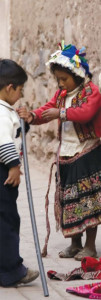Is . . . Property Rights
In 2000, Hernando de Soto, president of an influential Peruvian think tank and a prominent Third World economist, sets out to solve the mystery of why some people in the world can create capital and others cannot. Outside the West, in countries as different as Russia and Peru, it is not religion, culture, or race issues that are blocking the spread of capitalism but the lack of a legal process for making *property* systems work.
As Hernando De Soto (2000) has demonstrated, *property* rights to land and dwellings in developing nations are notoriously insecure—a fact that has helped *impoverish* the citizens of those nations. More generally, well-defined and enforced *property* rights are pivotal in shaping long-run economic growth and, thus, prosperity. Recent research by Erica Field (2007) is helping us understand one mechanism by which secure property rights raise wealth and improve the human condition: When rights to property are secure, people can spend their time creating wealth rather than defending it.
Implementing major legal change so as to establish a capitalist order involves changing peoples’ beliefs, and de Soto contends this is a political rather than a legal responsibility. He believes such a change can be achieved if governments seriously focus upon the needs of their poor citizens for a legally integrated *property* system that can convert their work and savings into capital. Political action is necessary to ensure that government officials seriously accept the real disparity of living conditions among their people, adopt a social contract, and then overhaul their legal system.
Capitalism stands alone as the only feasible way to rationally organize a modern economy. Capital is the force that raises the productivity of labor and creates the wealth of nations. According to De Soto, the problem outside the West is that while the poor have plenty of assets (land, homes, businesses), these assets lie overwhelmingly in the extralegal, informal realm. De Soto’s on-the-ground research reveals that this is the result of an accelerated process of urbanization and population growth, coupled with the inability of legal systems to adapt to the reality of how people live. What has happened is that throughout the Third World, the costs of making assets legal (obtaining proper title to a house, registering a business, etc.), are so prohibitive both in terms of time and money, that the assets end up being what de Soto calls “dead capital.” In the West, a web of financial and legal networks enable people to use their assets to create further wealth, through such tools as mortgages, publicly traded stocks, and the like. Outside the West, most people live and work outside the kind of invisible asset management infrastructure that we take for granted, and thus are unable to use their assets for the “representational purposes” we are able to. Thus the full set of capitalist tools are not available to them and it becomes incredibly hard to realize any kind of upward mobility.
Peru’s economy grew an average of 6.4 percent a year from 2002-12 after adjusting for inflation, according to government figures, a remarkable period of sustained expansion that has made it one of the world’s star economies.
De Soto identifies the crucial role *property rights* play in elevating the poor out of poverty. His groundbreaking book is available here at Amazon.com.
Read more about Peru’s successful rise out of poverty.
from: PERC Reports, Spring 2008, Volume 26, Issue 1
“Property, Work & Wealth”
by Daniel K. Benjamin
Filed under: Property Rights
Like this post? Subscribe to my RSS feed and get loads more!



Leave a Reply
You must be logged in to post a comment.